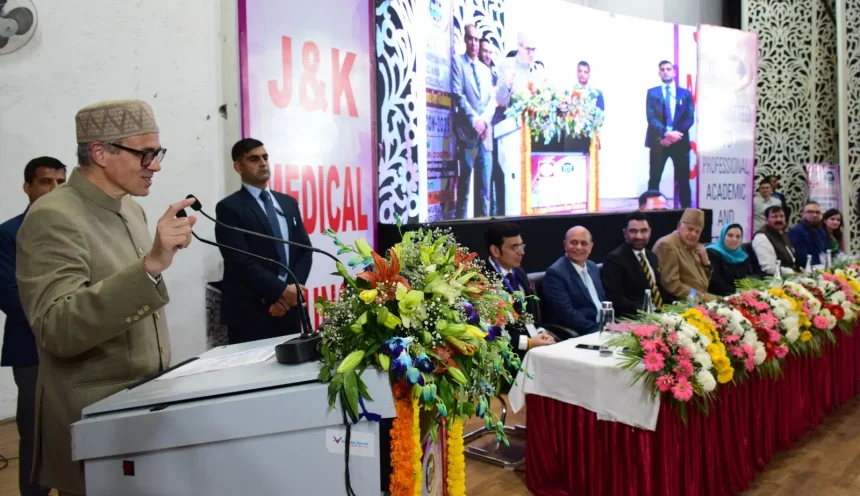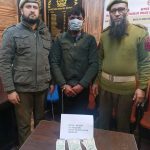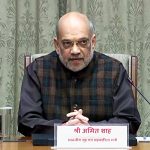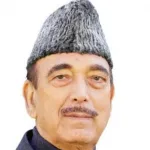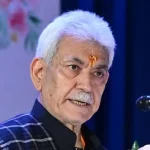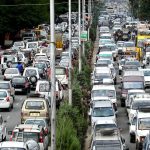Chief Minister Omar Abdullah today emphasized the need to improve handling of emergency cases and capacity at various Government Medical Colleges (GMCs) to ease the burden on major hospitals.
He also stressed the importance of ensuring that doctors serve beyond urban centers.
“We need to augment and improve the emergency handling capability and capacity in new GMCs so that the pressure on GMC Jammu and GMC Srinagar is automatically reduced. Similarly, we must ensure that our doctors don’t just practice in cities. I know it’s not a popular thing to say, but rural areas also deserve proper healthcare access,” he said.
The Chief Minister was addressing JK MediCon-2025, the first ever National Conference-cum-Workshop, at Government Medical College (GMC) Jammu.
The event was organized by the J&K Medical Council in collaboration with the Student Research Development Council (SRDC).
The conference was attended by Minister for Health & Medical Education Sakina Itoo, former Chief Minister Dr. Farooq Abdullah, Secretary H&ME Dr. Syed Abid Rashid, Jammu West MLA Arvind Gupta, Principal & Dean of GMC Jammu Dr. Ashutosh Gupta, Chairman JK Medical Council Dr. Muhammad Saleem Khan, senior professors, doctors, faculty and students.
Omar Abdullah highlighted his government’s commitment to improving healthcare accessibility across Jammu and Kashmir.
“Our challenge is to make healthcare more easily accessible. Professor Gupta pointed out the excessive pressure on GMC Jammu’s emergency services, which stems from the fact that healthcare in peripheral areas is not of the required standard. This forces people to flood into cities,” he noted. He emphasized that the solution lies in improving healthcare infrastructure in rural areas.
“The way to reduce this pressure is not just by expanding our infrastructure in Jammu but by strengthening facilities in peripheral areas. There was a time when we only had GMC Jammu and GMC Srinagar. Now, we have GMCs at the district level,” he said.
Speaking about MediCon-2025, the Chief Minister acknowledged its importance in fostering debates and discussions on key medical issues.
“There are all sorts of debates surrounding the topics that MediCon can address. The good thing is that students are involved through SRDC,” he said.
He also highlighted that participants will earn 11 credits through MediCon, which will encourage greater engagement and enthusiasm.
“I hope the futuristic advancements in medical science will be part of our discussions—how much technology is beneficial, how much human contact should be replaced by machines. While some tasks may be better performed by AI, there are things that only human beings can do,” he added.
Touching on the ethical dimensions of modern medical trends, Omar Abdullah raised concerns about the intersection of medicine and profit-driven healthcare.
“Where do we draw the ethical line in medicine? Is there such a thing as too much ethics? Does the pursuit of profit in medical care conflict with ethical responsibilities? Should hospitals treat patients as a means of revenue generation?” he asked.
He also noted the pressure on doctors working in corporate hospitals, where their performance is measured not by the number of patients they treat but by the revenue they generate.
Delving into the future of robotic surgery and Artificial Intelligence (AI) in medicine, the Chief Minister highlighted both the potential and concerns surrounding these advancements.
“One trend that seems to be catching on is the use of robotic surgery. Principal GMC Jammu mentioned that AI could one day take over medical procedures. Honestly, I can’t imagine a scarier prospect than entrusting my life entirely to a machine. At the end of the day, there is immense value in human contact, and that’s where doctors—who literally do God’s work—play an irreplaceable role,” he said.
He praised doctors for their dedication and lifelong learning.“You pull people back from the jaws of death. You give hope where all hope seems lost. You stand by patients and their families at their most vulnerable moments—whether in recovery or in times of loss,” he said.
“As doctors, you never stop learning. You are always adapting to new techniques, medicines, and treatment methods. But no machine can replace the human touch when a doctor delivers a diagnosis or a prognosis. Patients and their families hold on to every word a doctor says,” he added.
Chief Minister also acknowledged the growth plans for GMC Jammu and expressed his intent to contribute.
“Principal GMC Jammu presented several ideas for GMC Jammu’s future growth. My colleagues and I will ensure at least one of those proposals is implemented so that I, too, can have a foundation stone here and not feel left out in future presentations,” he said in a lighter vein.
He also underscored the significance of MediCon-2025, noting that it is the first of its kind in J&K and possibly in the country, where a state or regional medical council has organized such an event.
“This event brings together the best minds to share ideas, best practices, and research advances while discussing emerging trends in medicine,” he said.
Earlier, Principal GMC Jammu gave a detailed presentation on the college’s growth and future plans.


